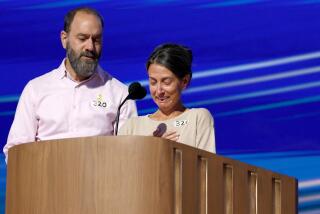Amid talk of democracy, Iraqi activists decry detentions
- Share via
Reporting from Baghdad — Encouraging the democracy protests sweeping the Arab world, President Obama has presented Iraq as a model for the region — praise that contrasts with the detention of four young activists for days without access to lawyers or their families.
Fellow protesters in the movement demanding better governance, including an end to corruption and improved services, say they worry they are next to be picked up by plainclothes security agents or paramilitary police seeking to crush their demonstrations. The army raided a meeting Saturday about the four and detained at least nine more people, said respected activist Hanna Edwar.
The activists are among a few hundred demonstrators who gather with posters and old bullhorns on Fridays in downtown Baghdad’s Tahrir Square, where they are cordoned off by ropes and watched by hundreds of police and soldiers in combat gear. The government remains deeply suspicious of them.
“These people, they know we have only our voices,” said Edwar, who meets regularly with members of parliament. “I am expecting the number of detentions will increase.”
The day before the arrest of the four young men Friday, the government tolerated a rally by tens of thousands of followers of radical Shiite cleric Muqtada Sadr, many of them former militia fighters, marching in uniform and threatening to go back to violence if U.S. forces stayed in Iraq after this year. No one was arrested.
The government’s actions raise the specter of a security apparatus that tolerates little dissent by people not affiliated with religious parties or any of the major groups in government. It also speaks to the limits of American influence in a country where the U.S. still has nearly 50,000 troops and has served as the main architect of the country’s new democracy and sponsor of those in power.
The government has been far from clear about the status of the four activists. First it said they were being held by military intelligence. Then it denied that, adding that there was no record of any protesters being arrested. Baghdad’s military command issued a statement late Tuesday saying that the four had been picked up with fake IDs in the same neighborhood as the demonstrations — a charge the men’s supporters called ludicrous. The men’s families were told they would be taken to see them Wednesday at a military intelligence prison.
Edwar said the nine others detained Saturday were probably being held in the same place.
The detained activists’ friends, mostly young people who met through Facebook, spent Sunday and Monday stealthily putting up posters about the four around university campuses.
A U.S. Embassy spokesman said he was not aware of the case or whether it had been raised with the Iraqi government.
A senior U.S. military officer, speaking on condition of anonymity, was critical of the U.S. response to the Iraqi government since a wave of protests began in February.
“People fully expected to hear from the embassy here and the president what they heard them say in other places: ‘We side with the demonstrators on the issue of reforming government, making government better in the provision of services and fighting corruption,” the officer said. “How hard is it for us to side with people on those issues? And yet, we stood by and were very silent, and when we spoke it very weak.”
Obama, in his speech last month, acknowledged that Iraq would face setbacks, but said it would play an important role in the region if its progress continued.
“In Iraq, we see the promise of a multiethnic, multisectarian democracy. The Iraqi people have rejected the perils of political violence in favor of a democratic process, even as they’ve taken full responsibility for their own security,” he said.
Sitting at a cafe Tuesday, two protest organizers who go by the code names Mohammed Guevara and Hussein Baghdadi in the hopes that will help them avoid arrest, laughed bitterly about Obama’s speech.
“Obama is talking about Iraq as a symbol of freedom,” said the one who goes by Guevara. “We don’t have such freedom. Where is it?”
The activists’ movement began coalescing in online debates about politics and religion, and at a rally in support of secularism in December after police raids on bars and a writers club that served alcohol.
People were beaten at a Feb. 25 rally, and dozens were arrested. Those who persisted found themselves being followed by security agents.
The pair interviewed Tuesday said the events of Friday started with a text message from Muayad Taieb, a 29-year-old actor and director who said he had been picked up by national police. Five friends at Tahrir Square decided to look for him. Three of them, Ali Jaff, Jihad Jalil and Ahmed Baghdadi, were first approached by a man in civilian clothes who tried to tackle one of them, and then confronted with soldiers who pointed assault rifles at their heads and pushed them into an ambulance.
“We don’t call this detention. It was a kidnapping,” said the activist who called himself Hussein Baghdadi. “Detentions have rules, including a warrant of arrest.”
The arrests last weekend have left activists with a deep sense of fatalism. The one who calls himself Guevara, a chubby, bearded 26-year-old, has taken to reciting verses from an old Lebanese song: “In my hand there is an old olive branch and my coffin is on my back. I am not afraid of dying.”
Jaff is a staff writer in The Times’ Baghdad bureau.
More to Read
Sign up for Essential California
The most important California stories and recommendations in your inbox every morning.
You may occasionally receive promotional content from the Los Angeles Times.










